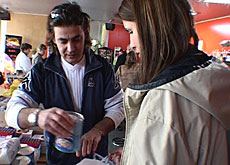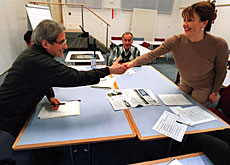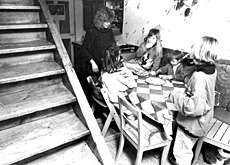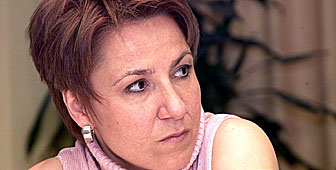Feeding the poor in richest Swiss region

Every Tuesday morning,
This is in Switzerland’s most affluent region, based on per capita income, but still there are pockets of poverty.
The people in the queue watch millionaires’ yachts bobbing in the nearby lake, as they wait for their numbers to be called.
It’s like a lottery. They never know what they will be taking home with them. This week, there are fresh vegetables, lemons, eggs, yoghurts, sugar, tea and chocolate. For a nominal fee of SFr1 ($0.80), they can fill up their paper shopping bags.
Each of these people has been referred by social services – they have the identity cards to prove it.
The food is provided by the Zurich-based charity, Tischlein deck dich (Table Be Set). The name is based on a fairy tale by the Grimm brothers.
Britta Kiefer, who runs the diner, Podium 41, told swissinfo: “We give them the amount of food they need to suit the size of their household.
“For single mothers with one child, it helps a lot. But for larger families, it’s just a drop in the ocean.”
The beneficiaries
The outward appearance of the people standing in line in this central Swiss town provides no clues as to their desperate economic state. They are mostly well groomed and neatly dressed.
According to the charity, Swiss Workers’ Aid, most poor people are ashamed of their financial situation and try to hide it.
People are considered to be poor as soon as they earn less than 50 per cent of the average net salary for the country they live in. The charity estimates that 850,000 people live below the poverty line, despite having a range of social benefits at their disposal.
The beneficiaries at Podium 41 vary from drug users and alcoholics to working people, who just cannot seem to make ends meet.
Anj Iten, a former bookkeeper with a management school diploma, has been out of work for three years.
“When I look for work in my field, all the adverts are targeted at 25-35 year-olds. I am 40 and a single mother. They’re not looking for people like me.”
Swallow your pride
She finds it very difficult to manage on welfare benefits alone, and says the food rations help her save SFr25-35 ($20.2-28.3) a week. “It takes some courage to come here, but you get used to it. It’s so helpful that you really have to swallow your pride,” she told swissinfo.
Suzi Rosenberger has three children, aged three, eight and 11, and works part time as a manicurist, but does not make enough to feed her family.
“The food we receive here saves us four to five hundred francs per month,” she said.
Montemurro Salvatore, who now works for Tischlein deck dich, has experienced his own riches to rags story. He used to own two restaurants, but the business collapsed, leaving him with nothing.
He now helps with the food distributions. He believes that there are many more poor people in Zug and elsewhere who would benefit from food handouts.
“In my opinion the food distributions are poorly advertised, and many people who could do with the help don’t dare to ask for it.”
Food mountain
About 250 million kilograms of edible food are destroyed in Switzerland every year. If this could be passed on instead to those living below the bread line, each of them would receive one kilo of food per day.
Tischlein deck dich tries to save as much of the condemned food as possible for the people who need it most.
Last year 84,000 bags of food, each weighing 5kg, were shared out among the poor.
The goods come from large distributors and major supermarket chains. Non-perishable products are stored in a warehouse. The rest is dispersed on the same day.
Three hundred volunteers hand out the goods at 23 distribution centres around the country. The warehouse staff and truck drivers are also volunteers.
The charity, which is financed by donations from the public, from foundations and private companies, is on track to help more people in the near future.
Up to five new distribution centres are being set up and the amount of food on offer will increase by 300 metric tons over the next two years.
swissinfo, Julie Hunt in Zug
The charity, Swiss Workers’ Aid, says 850,000 people live below the poverty line.
– 535,000 of these are in working poor households.
The worst affected are large families, single parents, the poorly educated and self-employed.
New research shows that the social security system does not do enough to help these people.

In compliance with the JTI standards
More: SWI swissinfo.ch certified by the Journalism Trust Initiative




You can find an overview of ongoing debates with our journalists here. Please join us!
If you want to start a conversation about a topic raised in this article or want to report factual errors, email us at english@swissinfo.ch.